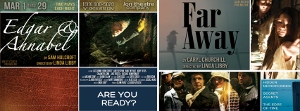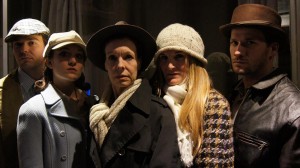THE FUTURE LOOKS BLIGHT
While there are a few missteps in both playwriting and direction, ion theatre’s presentation of two one-acts definitely held my attention. The only similarities between the plays is that they are penned by female British dramatists and that they take place somewhere in an uncertain and dystopian future. But there is a link. Sam Holcroft’s Edgar & Annabel (2011) is a comical look at undercover agents attempting to overthrow a Big Brother government; Caryl Churchill’s Far Away (2000) darkly examines a world that could emerge from such a régime’”where war permeates all things in existence.
The titular characters do not actually exist in Edgar & Annabel; they are fictional ruses created as a means to disguise a safe house that is used to build pipe-bombs. With bugs everywhere in this Orwellian landscape, Nick and his fellow resistance operative Marianne must be careful not to bring attention to their underground 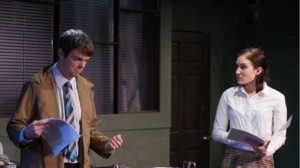 activities, so they speak in domestic banalities, holding a script written for them by a female revolutionary commander named Miller.
activities, so they speak in domestic banalities, holding a script written for them by a female revolutionary commander named Miller.
The opening scene is riveting as we watch “Edgar” and “Annabel” stockpile a cache of explosive material in their Ikea kitchen. But will they be able to keep government eavesdroppers off the scent when one of them accidentally says “fish” instead of “chicken”? Will Marianne be able to keep her cool even though Nick is a brand new “Edgar,” replacing a man with whom she had a cozy relationship?
During the next scene in a darkened alleyway, Nick (Zack Bonin) and Marianne (Abby Fields) rendezvous with Miller (Robin Christ), who is upset that their lovemaking doesn’t sound authentic. Her operatives clearly don’t get along, so Miller agrees to create a script that will create more tension at home: Edgar will be fired, Annabel gets a promotion, and they will lay off the sex.
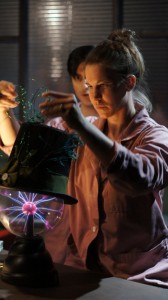 There’s a suspenseful sense of dramatic rhythm in Holcroft’s play, and the statement made about the way we are scripted by our circumstances’”in this case, life in a surveillance state’”can be explosively funny. While the play is hardly a gut-wrenching satire, Holcroft supplies imaginative business: A high farce sequence has another phony couple join Edgar and Annabel in the fake apartment to make bombs, but their sounds are covered up as these agitated rebels sing PlayStation karaoke into microphones. Director Linda Libby keeps the staging remarkably fluid as the four actors crisscross each other holding flammable material while blurting out Jefferson Starship’s “Nothing’s Gonna Stop Us Now” and Lauper’s “Time After Time.” Unfortunately, it becomes a long one-note joke because Libby does not supply her hard working actors with character choices behind the commotion. The scene becomes about choreography instead of creating tension.
There’s a suspenseful sense of dramatic rhythm in Holcroft’s play, and the statement made about the way we are scripted by our circumstances’”in this case, life in a surveillance state’”can be explosively funny. While the play is hardly a gut-wrenching satire, Holcroft supplies imaginative business: A high farce sequence has another phony couple join Edgar and Annabel in the fake apartment to make bombs, but their sounds are covered up as these agitated rebels sing PlayStation karaoke into microphones. Director Linda Libby keeps the staging remarkably fluid as the four actors crisscross each other holding flammable material while blurting out Jefferson Starship’s “Nothing’s Gonna Stop Us Now” and Lauper’s “Time After Time.” Unfortunately, it becomes a long one-note joke because Libby does not supply her hard working actors with character choices behind the commotion. The scene becomes about choreography instead of creating tension.
Libby cleverly employs aisles for scenes outside the apartment, but the playing areas could have been expanded so there wasn’t so much neck-craning for certain patrons. It also seems odd that Miller is clothed in a turtleneck, trench coat and fedora (you would think she would try to dress less obvious). Written prior to the Edward Snowden N.S.A. leak, it’s an enjoyable play which creates a believable context in which an oppressive government monitors our every move. This fits snugly into “promising playwright” territory: Holcroft writes terrific dialogue within an almost cinematic framework, building to a smart finish; I just wish it was more politically savvy.
For the better part of her long and distinguished career, playwright Caryl Churchill (Cloud Nine) has veered from realism in order to explore themes of sexual and feminist politics while bringing attention to barbarism and the abuse of power. Occasionally, she strays into Theatre-of-the-Absurd territory, vacillating between Naturalism and Surrealism with such rapidity that it’s difficult to glean any meaning from her works, let alone follow the story.
Such is the case with her Far Away (2000), a short play that takes us into an apocalyptic world where, eventually, every living creature is at war. The writing is so dense with ideas and metaphors that a thesis could be written about its musings on war, the inevitability of human suffering, and the Big Brother phenomenon.
The opening scene is a prototype of solid dramatic playwriting as Churchill intensifies the tension with each line of dialogue. It is night in some rural locale, and a young girl, Joan (a solid Abby DeSpain), is gently interrogating her aunt, Harper (Christ again), with whom she is staying. Joan believes she heard a shriek, and crept out of the house to investigate. The aunt rationalizes it must have been an owl. The 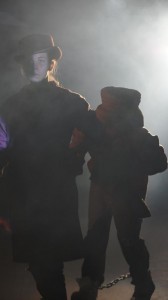 child continues her questioning, and bit by bit it becomes clear that the child has witnessed horrific events committed by her uncle involving blood, trucks (called lorries), and the pummeling of children.
child continues her questioning, and bit by bit it becomes clear that the child has witnessed horrific events committed by her uncle involving blood, trucks (called lorries), and the pummeling of children.
Years later, an older Joan (Rachel VanWormer) works in a tyrannized hat factory with a young man named Todd (Hanz Enyeart). The short scene segues into a horrendous parade of scruffy, manacled prisoners wearing the strange hats on their way to execution. The final scene at a farmhouse brings Harper, Joan, and Todd together at the end of the world; in a startlingly humorous scene, we discover that cats have sided with the French, Bolivians are working with gravity, and deer are not to be trusted. I loved how Ms. Christ sits there defiantly rocking in her chair like Lillian Gish in Laughton’s The Night of the Hunter (1955) as if she could guard her family from global annihilation. Churchill’s play attacks World States, but it’s really about everyday folks who partake in and maintain the many powers that lead to apocalypse.
While I enjoyed the nightmarish ambiguity and the absence of resolution, the bounce from surreal to real is extraordinarily rapid and therefore unconvincing. Playgoers will either be utterly astounded by the sheer weirdness of it all or completely perplexed and alienated. While the prisoner march sears a haunting image which remains long after the show, Libby could have made the experience far creepier. Still, there are enough shocks and surprises to see this apocalypse now.
photos courtesy of ion theatre
Edgar & Annabel and Far Away
ion theatre company
BLKBOX, 3704 Sixth Avenue
scheduled to end on March 29, 2014
for tickets, call (619) 600-5020 or www.iontheatre.com
